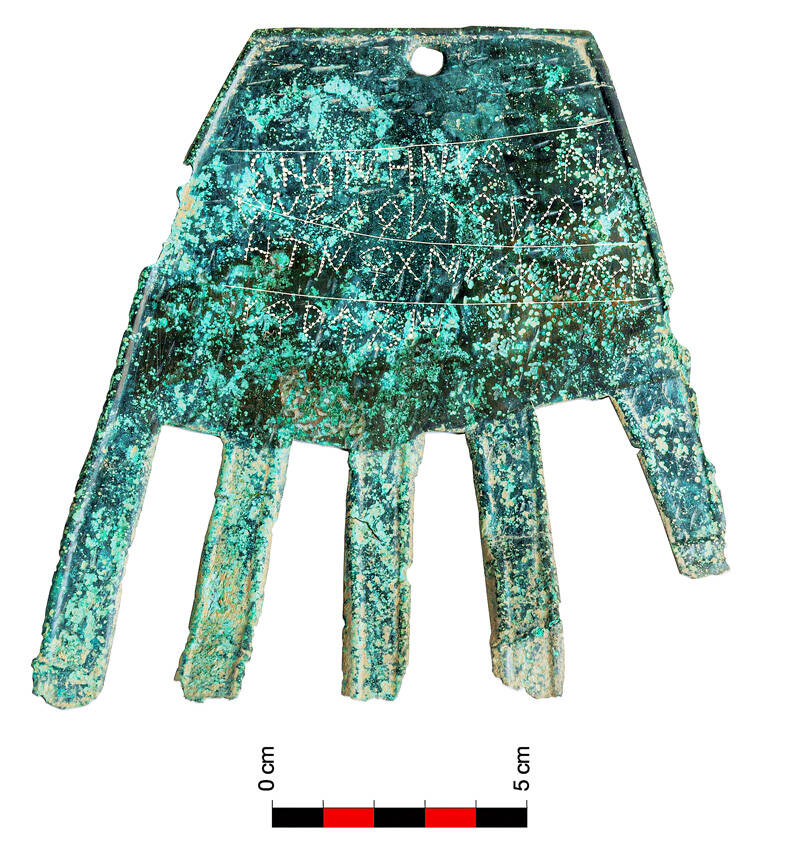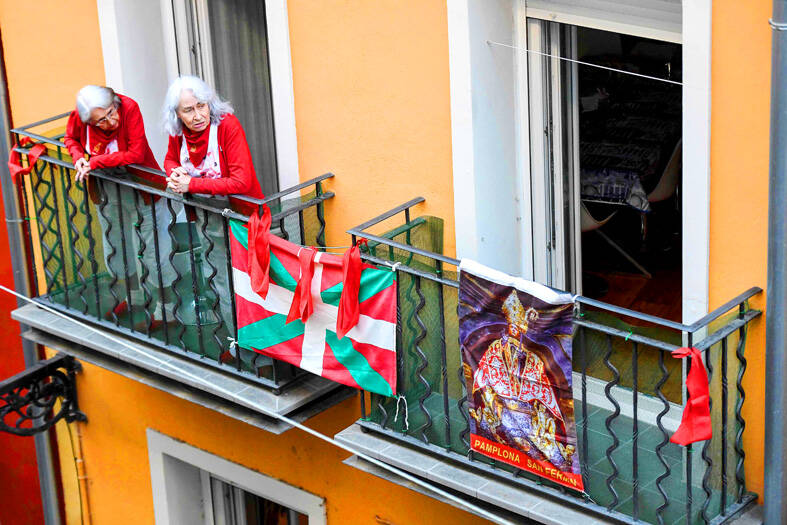More than 2,000 years after it was probably hung from the door of a mud-brick house in northern Spain to bring luck, a flat, life-size bronze hand engraved with dozens of strange symbols could help academics trace the development of one of the world’s most mysterious languages.
Although the piece — known as the Hand of Irulegi — was discovered last year by archeologists from the Aranzadi Science Society who have been digging near the city of Pamplona since 2017, its importance has only recently become clear.
Experts studying the hand and its inscriptions now believe it is the oldest written example of Proto-Basque, a find that “upends” much of what was previously known about the Vascones, a late iron age tribe that inhabited the area before the arrival of the Romans, and from whose ancient language modern Basque is thought to descend.

Photo: AFP / GOVERNMENT OF NAVARRA
Until now, academics believed that the Vascones had no written language — save for words found on coins — and only began writing after the Romans introduced the Latin alphabet.
However, the five words written in 40 characters identified as Vasconic, suggest otherwise.
The first — and only word — to be identified so far is sorioneku, a forerunner of the modern Basque word zorioneko, meaning good luck or good omen.

Photo: AFP
“This is the first document undoubtedly written in the Vasconic language and in characters that are also Vasconic,” said Javier Velaza, a professor of Latin philology at the University of Barcelona and one of the experts who deciphered the hand. “The writing system used is odd — it’s a writing system derived from the Iberian system, although there have been some adaptations to represent some sounds and phonemes that don’t exist in Iberian characters, but which have been seen in coins minted in Vascones territory.”
As a result, the artifact proves the existence of a specifically Vasconic writing system in use at the time it was made, Velaza said.
His colleague Joaquin Gorrochategui, a professor of Indo-European Linguistics at the University of the Basque Country, said the hand’s secrets would change the way academmics looked at the Vascones.
“This piece upends how we’d thought about the Vascones and writing until now,” he said. “We were almost convinced that the ancient Vascones were illiterate and didn’t use writing except when it came to minting coins.”
Mattin Aiestaran, the director of the Irulegi dig, said the site owes its survival to the fact that the original village was burned and then abandoned during the Sertorian war between two rival Roman factions in the 1st century BC.
The objects they left behind were buried in the ruins of their mud-brick houses.
“That’s a bit of luck for archeologists and it means we have a snapshot of the moment of the attack,” Aiestaran said. “That means we’ve been able to recover a lot of day-to-day material from people’s everyday lives. It’s an exceptional situation and one that has allowed us to find an exceptional piece.”
However, not every recent Basque-language discovery has lived up to its billing.
Two years ago, a Spanish archeologist was found guilty of faking finds that included pieces of third-century pottery engraved with one of the first depictions of Jesus, Egyptian hieroglyphics and Basque words that predated the earliest known written examples of the language by 600 years.
Although the archeologist, Eliseo Gil, said the pieces would “rewrite the history books,” an expert committee examined them and found traces of modern glue, as well as references to 17th-century French philosopher Rene Descartes.

Thousands gathered across New Zealand yesterday to celebrate the signing of the country’s founding document and some called for an end to government policies that critics say erode the rights promised to the indigenous Maori population. As the sun rose on the dawn service at Waitangi where the Treaty of Waitangi was first signed between the British Crown and Maori chiefs in 1840, some community leaders called on the government to honor promises made 185 years ago. The call was repeated at peaceful rallies that drew several hundred people later in the day. “This government is attacking tangata whenua [indigenous people] on all

The administration of US President Donald Trump has appointed to serve as the top public diplomacy official a former speech writer for Trump with a history of doubts over US foreign policy toward Taiwan and inflammatory comments on women and minorities, at one point saying that "competent white men must be in charge." Darren Beattie has been named the acting undersecretary for public diplomacy and public affairs, a senior US Department of State official said, a role that determines the tone of the US' public messaging in the world. Beattie requires US Senate confirmation to serve on a permanent basis. "Thanks to

UNDAUNTED: Panama would not renew an agreement to participate in Beijing’s Belt and Road project, its president said, proposing technical-level talks with the US US Secretary of State Marco Rubio on Sunday threatened action against Panama without immediate changes to reduce Chinese influence on the canal, but the country’s leader insisted he was not afraid of a US invasion and offered talks. On his first trip overseas as the top US diplomat, Rubio took a guided tour of the canal, accompanied by its Panamanian administrator as a South Korean-affiliated oil tanker and Marshall Islands-flagged cargo ship passed through the vital link between the Atlantic and Pacific oceans. However, Rubio was said to have had a firmer message in private, telling Panama that US President Donald Trump

RIGHTS FEARS: A protester said Beijing would use the embassy to catch and send Hong Kongers to China, while a lawmaker said Chinese agents had threatened Britons Hundreds of demonstrators on Saturday protested at a site earmarked for Beijing’s controversial new embassy in London over human rights and security concerns. The new embassy — if approved by the British government — would be the “biggest Chinese embassy in Europe,” one lawmaker said earlier. Protester Iona Boswell, a 40-year-old social worker, said there was “no need for a mega embassy here” and that she believed it would be used to facilitate the “harassment of dissidents.” China has for several years been trying to relocate its embassy, currently in the British capital’s upmarket Marylebone district, to the sprawling historic site in the